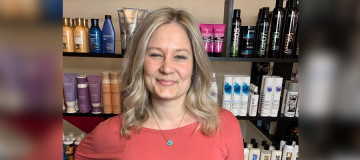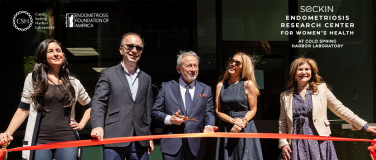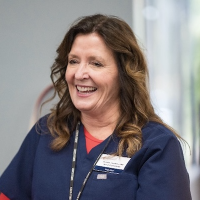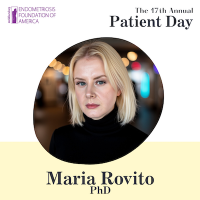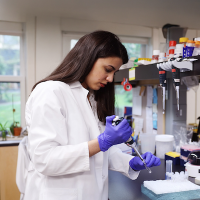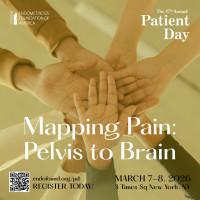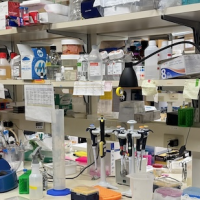
Most women with endometriosis, beginning with their first menstrual periods as young girls, suffer for years without knowing the source of their ravaging pain and other symptoms. During their desperate pursuit for answers, doctors repeatedly misdiagnose them or callously dismiss their claims. Even when correctly diagnosed with the disease, the treatment they receive is often inadequate.
That’s Alexis Roderick Joel’s story, but with one unique exception: her endometriosis symptoms didn’t begin until she was 35, soon after her second pregnancy.
“I always had long and heavy periods, but I didn’t have to stay home from school or have any issues like that growing up,” Roderick Joel said. “In August 2015, I competed in the Hampton Classic [Horse Show] two weeks after my first child was born; that’s how quickly I bounced back. But after having my second child in October 2017, I didn’t feel great and knew something wasn’t right.”
Roderick Joel is part of the estimated one in 10 women in the U.S. and more than 200 million worldwide with endometriosis. The chronic disease occurs when endometrial-like tissue implants on organs outside of the uterus. It’s often characterized by heavy and painful periods, debilitating pelvic pain, severe cramps, painful bowels, painful sex, and infertility. In rare cases, it can affect the kidneys, sciatic nerve, diaphragm, and lungs.
The cause of endometriosis is unknown. Diagnosing it can take many years, even decades, due mainly to a lack of education and awareness among medical professionals and the general public. It is also often misdiagnosed because the symptoms are similar to other conditions, including irritable bowel syndrome, ovarian cysts, and appendicitis.
Roderick Joel, now 43, said that in the months after her second child was born, her stomach felt distended and painful. When she realized it wasn’t improving and occurred in conjunction with her period, she searched for answers.
“I started with a gynecologist, who thought I had PCOS [polycystic ovary syndrome],” Roderick Joel said. “Another one brought me in for surgery to remove polyps, but when they went in to do the surgery, they said the polyps were gone. That led to a million other things—a diagnosis of IBS, then acid reflux, then something with my stomach. One internist told me nothing was wrong with me. For years, I spent my time bouncing from one doctor to another, probably eight to 10 of them. It was a nightmare.”
In late 2022, Roderick Joel—who splits her time between homes in Florida and New York—found a gynecologist in Florida who asked her if she’d ever heard of endometriosis. She had but didn’t know what it was.
“He said, ‘I think you have it. Your uterus is pulled to one side of your body because it’s stuck to other organs,’” Roderick Joel said. “By this time, I’d gained 15 pounds in about three months. I was lethargic. I couldn’t ride horses. It hurt to even walk or stand. One time, I dropped to my knees in pain, saw stars, and thought I was going to pass out. It was very dramatic and getting worse.”
The doctor told Roderick Joel the only way to officially diagnose the disease would be through a laparoscopy. He told her if he confirmed that she had endometriosis (which he would), he would burn it off with a laser, and recovery would be just a few days.
“About two days after the surgery [in January 2023], I woke up doubled over in pain and crying,” Roderick Joel said. “I called my regular doctor, talked to his nurse practitioner, and told her I had to go back to the hospital. I felt like I was dying.”
Roderick Joel returned to the hospital, where her situation worsened.
“They pumped me with fluids to the extent that I couldn’t open my eyes, gave me a catheter, and told me there was nothing wrong with me,” she said. “At one point, I fell asleep and didn’t wake up for 36 hours. The doctor who’d done my surgery was calling my cell phone to scream at the nurses taking care of me. It was a disaster.”
And with that, they sent Roderick Joel home.
“They released me with no information. They said, ‘There’s nothing else we can do. We think you’re fine on paper, so you can go.’ I thought, What? I can’t go! They gave me no help or relief. Nothing had changed.”
When Roderick Joel got home, she repeatedly called her gynecologist “to the point that I felt like I was annoying him.” She said he told her to “just get a hysterectomy already and be done with this.”
“That didn’t seem right, either,” Roderick Joel said, “especially coming from the one who did my surgery and said he was going to help me then. I was going crazy.”
Two months later, Roderick Joel decided she needed to seek care outside of Florida. She flew to New York without a plan but with a glimmer of hope that changing scenery and knocking on new doors would lead her to the care she needed. Instead, her nightmare persisted.
“I went to one endometriosis center where they said, ‘Nope, you don’t have endometriosis. It looks like the pain is coming from your bladder.’ I then spoke to the head of gynecology at a major institution, who said, ‘Nope, this definitely is not endometriosis. I don’t know who told you that.’ It was horrible.”
Roderick Joel would spend nearly that entire next year in sustained agony, unable to find anyone who could help.
“That’s when I really started researching to figure out who was a specialist,” she said. “I didn’t want a center or institution anymore; I wanted a specific person. And everything was pointing me toward Dr. Seckin.”
Dr. Tamer Seckin, an internationally renowned endometriosis specialist and excision surgeon, is the co-founder of EndoFound and founder of the Seckin Endometriosis Center in Manhattan.
“I saw that [comedian] Amy Schumer had gone to him, and she and I had friends in common,” Roderick Joel said. “When I reached out to her, she said Dr. Seckin changed her life and that I should absolutely go to him. I spoke with him the next day and told him I needed surgery.”
In March 2024, soon after examining Roderick Joel, Dr. Seckin performed a lengthy and complicated surgery on her. He removed her appendix and 27 specimens from throughout her pelvic region, including several endometriosis lesions and a significant amount of scar tissue from her laser surgery.
By the summer, Roderick Joel was back in the saddle, figuratively and literally. Her unwavering resilience had paid off.
“I’m definitely better today,” she said. “I have my life back.”
At the center of that life are her husband and two daughters, who regularly witnessed their wife and mom’s pain.
“I know there was no way that I was a pleasant person to be around,” Roderick Joel admitted. “I was tired. I was miserable. I had a short fuse. I never knew on a particular day how I was going to feel.
“It was hard,” she continued. “While I was in all of this pain, my husband was working and traveling, and the kids and I were traveling. I did it, but I didn’t do it well.”
Roderick Joel’s husband is legendary singer and songwriter Billy Joel. She said they navigated the disease together and continue to do so today.
“I didn’t know much about endometriosis, and he didn’t know anything about it at all, but we were both in it trying to figure it out together,” she said. “Now, he’ll send me articles and say, ‘Did you know this happens when you have endometriosis?’ We both still research.”
They research not just for her sake but for the millions suffering worldwide and the young girls, like their two daughters, who may have to face this disease one day. Roderick Joel plans to use that newfound knowledge and her personal experience to support EndoFound and Dr. Seckin by raising awareness in schools, assisting with federal lobbying efforts, and promoting scientific research. She also hopes sharing her story will help others who are misdiagnosed, dismissed, or receiving inadequate treatment.
“You need to be your own best advocate,” Roderick Joel said. “We used to accept a doctor’s answer and never question it, but I think those times have changed. You know when something is wrong and things aren’t okay. If you’re in that much pain and to that extreme, don’t give up, even if the doctors are telling you no and that you’re crazy. Find a specialist, and when the time comes that you need surgery, do excision surgery.”



